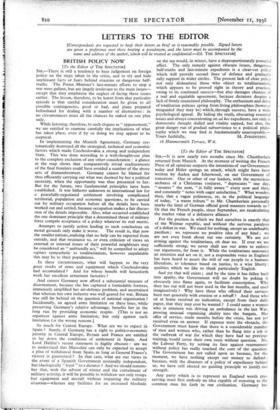BRITISH POLICY NOW
LETTERS TO THE EDITOR
[Correspondents are requested to keep their letters as brief as is reasonably possible. Signed letters are given a preference over those bearing a pseudonym, and -she latter must be accompanied by the name and address of the author, which will be treated as confidential.—Ed. THE SPECTATOR] [To the Editor of THE SPECTATOR] SIR,—There is still a tendency to base judgement on foreign policy on the steps taken in the crisis, and to try and hide unpleasant facts or fears behind evasions or dangerous half- truths. The Prime Minister's last-minute efforts to stop a war were gallant, but are largely irrelevant to the main issues— except that they emphasise the neglect of facing these issues earlier. The lesson, therefore, to be learnt from that particular episode is that careful consideration must be given to all possible contingencies, good or bad, and plans prepared beforehand for dealing with a number of alternatives : in no circumstances must all the chances be staked on one plan only.
While listening, therefore, to such slogans as " appeasement," we are entitled to examine carefully the implications of what has taken place, even if by so doing we may appear to be sceptical.
In implementing the Munich Agreement, Germany sys- tematically destroyed, all the strategical, technical and economic factors which made Czechoslovakia a strong and independent State. This was done according to a well-thought-out plan to the complete exclusion of any other consideration : a glance at the map shows that comparatively trivial readjustments of the final frontiers could have avoided a number of the above acts of dismemberment. Germany cannot be blamed for thus efficiently carrying out what was deemed by her a political necessity, when the opportunity was thus presented to her. But for the future, two fundamental principles have been established. It was hitherto unknown in international law for a peacefully-negotiated settlement involving complicated territorial, population and economic questions, to be carried out by military occupation before all the details have been worked out and settled, because occupation makes a fair discus- sion of the details impossible. Also, what occurred established the one dominant principle that a determined threat of military force compels acceptance of a policy whatever its real merits.
Attempts to justify action leading to such conclusions on
moral grounds only make it worse. The result is, that now the smaller nations, realising that no help can be expected from outside, and that resistance to, or even criticism of views on external or internal issues of their powerful neighbours may be considered an "unfriendly act," will be compelled to adopt regimes sympathetic to totalitarianism, however unpalatable this may be to their populations.
In these circumstances, what will happen to the very great stocks of arms and equipment which Czechoslovakia had accumulated ? And for whose benefit will henceforth work her excellent armament factories ?
And cannot Germany now afford a substantial measure of disarmament, because she has captured a formidable fortress, immensely simplified her air-defence problem, and ascertained that whereas her own industry was well geared for war, Britain was still far behind on the question of national organisation ? Incidentally, an agreed arms limitation on these lines, while preserving Germany's relative advantage, benefits her in the long run by providing economic respite. [This is not an argument against arms limitation, but only against such limitation far the wrong reasons.] So much for Central Europe. What are we to expect in Spain ? Surely, if Germany has a right to politico-economic priority in Central Europe, Britain and France are entitled to lay down the conditions of settlement in Spain. And Lord Halifax's recent statement is highly obscure : are we to understand that Mussolini can only be expected to accept a plan of withdrawal from Spain, as long as General Franco's victory is guaranteed ? In that case, what are our views in the event of a Spanish Government nominally independent, but ideologically " loyal "to a dictator ? And we should remem- ber that, with the advent of winter and the curtailment of military activity, it will be possible to withdraw not only troops but equipment and aircraft without impairing the military situation—whereas any facilities for an increased blockade
on the sea would, in winter, have a disproportionately powerful effect. The only remedy against obscure issues, dangerous half-truths and last-minute expedients is a clear-cut policy which will provide second lines of defence and gradually rally support in wider circles. The present lack of clear policy not only disheartens those who object to totalitarianism, which appears to be proved right in theory and practice, owing to its continued success—but also damages chances of a real and equitable agreement, because dictators despise a lack of firmly enunciated philosophy. The enthusiasm and drive of totalitarian policies spring from living philosophies (however misguided they may be) which, through success, have a wide psychological appeal. By hiding the truth, obscuring essential issues and always concentrating on ad hoc expedients, not only is democratic thought dulled and vitality sapped, but also, the great danger run of gradual subservience to a political philo- sophy which we may find is fundamentally unacceptable.—










































 Previous page
Previous page